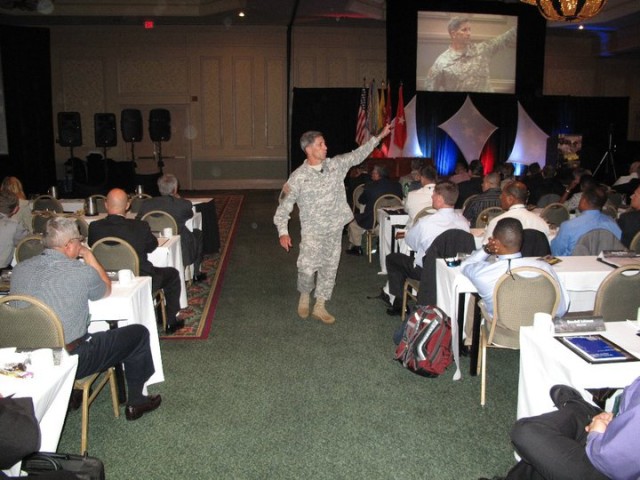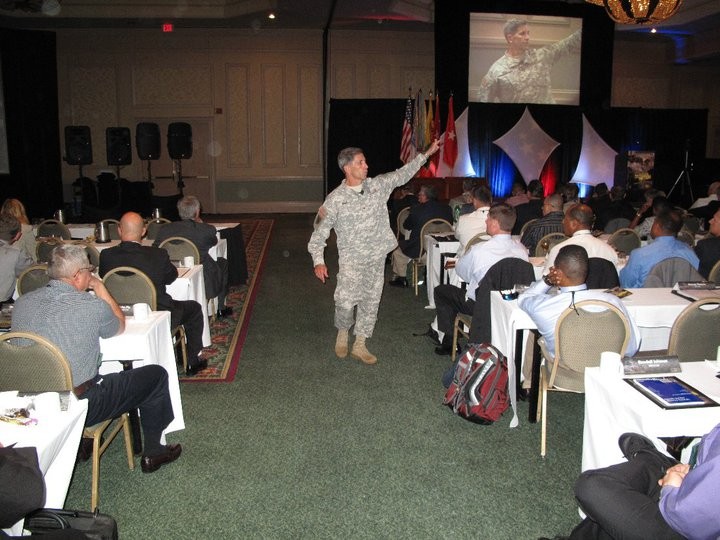
PANAMA CITY BEACH, Fla. - Dedication to the safety and well-being of Soldiers, Families and Civilians was the topic of the day as several of the Army's top senior leaders kicked off the 2010 Army Senior Safety Tactical Symposium here Sept. 14.
Keynote speakers for the first full day of the semi-annual symposium included Brig. Gen. Bill Wolf, director of Army Safety and commanding general, U.S. Army Combat Readiness/Safety Center; Lt. Gen. Rick Lynch, commanding general, U.S. Army Installation Management Command; and Gen. Peter Chiarelli, Army vice chief of staff. Wolf began the day with an update on the status of the Army Safety Program in fiscal 2010.
Overall, Army fatalities are stabilizing, if not decreasing, Wolf said. He attributed this to engagement on all fronts - by leaders, individual Soldiers, Family members and Civilian employees - but stressed that leadership is just as important during off-duty hours as during the work day.
"Leadership makes a difference, both on and off duty," Wolf said. "It's the leader's job to make sure Soldiers act responsibly," even after hours.
Lynch echoed Wolf's emphasis on engaged leadership, asserting leaders are just as responsible for Soldier safety as the individuals themselves. The key to safety success, he said, is empowering leaders at all levels to engage with their Soldiers, both on and off duty.
He also urged the safety professionals in attendance to take a hard look at their relationships with their senior commanders and ask tough questions about what they can do to improve safety within their units.
"The most important piece of furniture in your house is your mirror," Lynch said. "Ask yourself, 'Do I have direct access to my senior commander' Does he know who I am' If we don't do the safety program right, some kid's going to kill himself."
Chiarelli spoke on the importance of early intervention with high-risk Soldiers.
"Safety is a top concern," he said. "We need to do a better job of looking out for one another, both on and off duty."
Chiarelli said the deadliest hazards many Soldiers face are encountered at home after duty hours. However, a combat mentality has led some leaders and Soldiers to discount risks outside the battlefield.
"Sure, our Soldiers aren't being shot at in the motor pool or in their barracks rooms," he said. "Many of our Soldiers and leaders don't know what to do (in garrison)."
Chiarelli said one of the greatest tools every leader, Soldier, Family member and Civilian employee can have is awareness of the resources available to assist them in keeping the total force safe. He said to get a maximum return on those resources, however, everyone should make safety their "business."
In almost every Soldier death related to high-risk behavior, including accidents and suicides, "somebody always seems to know" the Soldier was having problems, Chiarelli said. "But we don't find out until after the fact."
Part of the solution, he said, is to encourage Family members and peers to actively seek help without fear of harming the Soldier's career.
The symposium will continue Sept. 15, with addresses from Lt. Gen. William Troy, director of the Army Staff, and Lt. Gen. Daniel Bolger, deputy chief of staff, Army G-3/5/7. Stay tuned to the U.S. Army Combat Readiness/Safety Center's Facebook and Twitter pages for live updates on these scheduled events.

Social Sharing